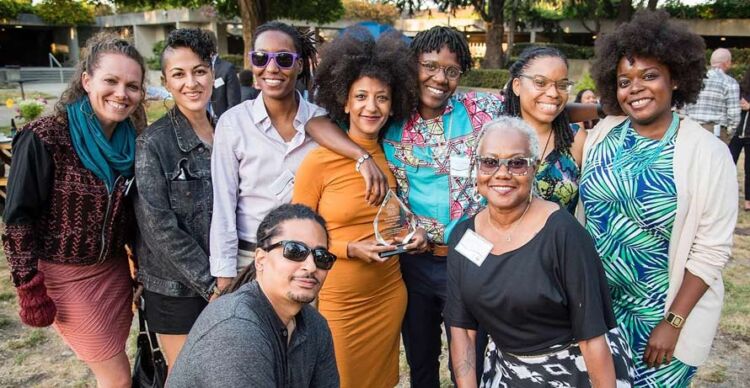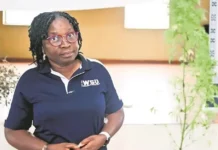Cannabis has long been Anthony Reyes’ passion. Like millions of Americans, he first self-medicated with marijuana as a young man, purchasing from underground dealers as so many other weed enthusiasts do. But cannabis was always mainly about healing for Reyes: His uncle was a curandero, a medicine man, in his native Cuba and used cannabis as part of his healing practice. In 2010, at the age of 30, Reyes began experimenting with adding cannabis to edible treats in his hometown in Miami. They were a hit. By 2014, as momentum was building in favor of legalized recreational marijuana in California, Reyes started adding the drug to Latin Caribbean family recipes. He moved to Oakland to attend university. He worked a few jobs in the legal weed industry, but dreamed of one day starting his own cannabis company.
That’s when Reyes first heard about the Hood Incubator, a small organization that helps transition underground cannabis dealers into the legal market. While enrolled in the Hood Incubator’s business accelerator program, Reyes launched iTranscend Foods, a catering company that offers Puerto Rican dishes infused with cannabis. He now has big plans for his business – plans that are possible thanks to California’s new marijuana laws, including the 2016 passage of recreational marijuana use.
The Hood Incubator, based in Oakland, is about to enter its third year of operation, and one of its young founders recently won a Forbes 30 Under 30 recognition. By focusing on black and Hispanic populations, the organization aims not just to help its incubatees start legal weed businesses, but to begin the healing process after decades of social injustice related to cannabis criminalization.
The war on drugs has resulted in the arrest of millions of people of color since Presidents Ronald Reagan, George H.W. Bush, and Bill Clinton initiated policies like minimum mandatory sentencing for possession of marijuana. Despite similar rates of use across racial groups, African Americans are 3.73 times more likely than whites to be arrested for a marijuana offense nationally. In New York City between 2014 and 2016, more than 60,000 people were arrested for marijuana, and 52,730 were black or Latino.
Despite the outsized share of the legal consequences shouldered by minorities, in the six years since Colorado and Washington became the first two states to legalize recreational marijuana in 2012, the industry has become controlled largely by white men. In 2017, 73 percent of cannabis executives were men and 81 percent were white, according to Marijuana Business Daily. With the business slated to be worth more than $20 billion nationally by 2020, unless drastic action is taken, the very people who built the cannabis industry in America may miss out on its now-legal profits.
“Before the criminalization of the plant, we were experts,” says Hood Incubator co-founder Lanese Martin. “We actually have the knowledge [of marijuana] in our communities.”
But translating expertise and experience into profits can be difficult in the legal weed industry, especially if you’re black, says Ebele Ifedigbo, the Hood Incubator’s bespectacled, dreadlocked second co-founder. The stigma surrounding cannabis can make it more difficult for people of color to make headway in the industry. Dejah Fortune, who joined the Hood Incubator to develop his Oakland-based cannabis business, Edens Bloom Apothecary, says he encountered racial prejudice from his very first introduction to the industry. “I went to an industry networking event, where the point is to network and see who has resources,” Fortune says. “And I found some people would not even reply ‘hello’ when I introduced myself.”
Across all industries, people of color face obstacles to building businesses that whites do not, like lack of access to capital, advisers, and networks, as well as discrimination from banks while applying for small business loans. The cannabis industry is no different, Ifedigbo says. “If you’ve been operating in the underground cannabis industry, you might have all the set-ups, you might’ve been making money for years, but people don’t take your business experience seriously.”
“It all boils down to finances,” Fortune says. “That’s the main obstacle, that access to capital, and that comes back to economics. Being a woman, a person of color, a person with disability, sometimes it’s harder to access that funding.”
This injustice is what the Hood Incubator aims to correct. The project is the brainchild of Ifedigbo and Martin, who met in 2016 at a potluck mixer for Oaklanders interested in the cannabis industry and bonded over what they saw as a vast need in the industry. Ifedigbo and Martin knew their combined experience could drive the solution they were looking for: To bring the “green rush” to people of color.
Six months later, the two officially launched the Hood Incubator. It provides a free crash-course in business and networking to people of color aspiring to cannabis entrepreneurship. The organization is a non-profit funded by a mix of foundations, corporate sponsors, individual donors, event revenues, and member dues.
The Hood Incubator’s work is divided into three areas: economic development, policy and advocacy work, and community organizing. Its first Pre-Seed Accelerator training program began in January and finished in May of 2017. It was a 100-hour business intensive course, after which 10 aspiring graduates pitched their ideas for cannabis businesses to the community.
The program’s first cohort of students included diverse individuals with varied business interests, including some, like Reyes, who already sold marijuana illegally. “We have folks who were already operating in the industry,” Ifedigbo says. “Maybe more informally, but they already have customers, revenues, everything like that. And then we have other people who are coming in with other experiences, like culinary or tech.”
Ifedigbo says that the Pre-Seed Accelerator was responsible for encouraging business relationships before anyone had even completed the course. “One participant came in with a plan to open a brick-and-mortar dispensary, and another came in with a plan to open a delivery business,” Ifedigbo says. “They actually wound up teaming up, and they just had their delivery service company launch.”
In addition to the Pre-Seed Accelerator, the Hood Incubator is piloting a program to place people of color in apprenticeship programs to jump-start their careers in cannabis. “Ownership is critical in this industry, but there’s also gonna be a lot more jobs than there are business owners in the industry,” Ifedigbo says. “And a lot of these jobs that are coming online are gonna be well paying, career track-type jobs. We saw a job opening for a director of extraction at a cannabis manufacturing firm, and the starting salary was $100,000.”
The incubator’s scope also extends to the political realm. Its founders have worked to organize the Oakland community to advocate for progressive marijuana legislation and practices. One such city policy, the Cannabis Equity Program, prioritizes Oakland residents with prior convictions for marijuana crimes for business permits.
For all of their big dreams, the Hood Incubator team still must reconcile the fact that they’re a small organization trying to rectify the damage from a decades-long, government-backed, multi-trillion-dollar war against drugs. Ten businesses launched from the Pre-Seed Accelerator 2017 cohort, and, as of September of 2018, six of the 10 are still actively operating. But with a micro-focus on 10 to 15 entrepreneurs at a time, the Hood Incubator model will need to go viral to spread its impact nationally.
According to Martin and Ifedigbo, though, the movement is growing. Two weeks after founding the organization, the pair started getting calls from activists all over the country, asking how they could replicate the Hood Incubator in their own cities. “A lot of people, not only in California, are watching Oakland, but around the country,” Martin says. If the Hood Incubator can serve as a model for opening doors to people of color who want to get into the legal marijuana industry across the country, they’ll consider it a win.
“When we craft policy here, New York State can adopt it,” says Juell Stewart, the Hood Incubator’s former communication director. “They can make model policies and test them outside of California, and other states and municipalities can look at them and say, ‘Oh, that might work here.'”
Thanks in part to the Hood Incubator, Reyes has made steady progress toward his vision for iTranscend Foods. He met his first goal of launching catering operations by January of 2018, and hopes to expand to a food truck and restaurant space within the next four years. “Hood Incubator allowed me to put together my business plan so I can work on marketing and seeking more of a following,” he says. “They allowed me to put my vision together and informally start on the plan that I have.”
On April 20th, 2017, the Hood Incubator celebrated the unofficial marijuana holiday by organizing a community event at an urban farm, including vendor booths, music, food, and cannabis-infused products created by local start-ups. Across the sprawling farm, between the chicken coops, the first plant shoots are popping up into the hazy spring afternoon. The Hood Incubator advisers, incubatees, and local cannabis business owners lounge on tree stumps and folding chairs drinking beer, sampling “420-medicated” hot wings, and passing a blunt around the group while discussing business. To the uninitiated, the scene looks like a casual backyard barbecue, but it’s undeniably a networking event – the kind that one would be hard-pressed to find outside of Oakland.
The effects of the war on drugs won’t be reversed by throwing a few good parties. But the Hood Incubator’s founders know it will take genuine community building to take the first healing step. And that’s exactly what they have set out to do.











